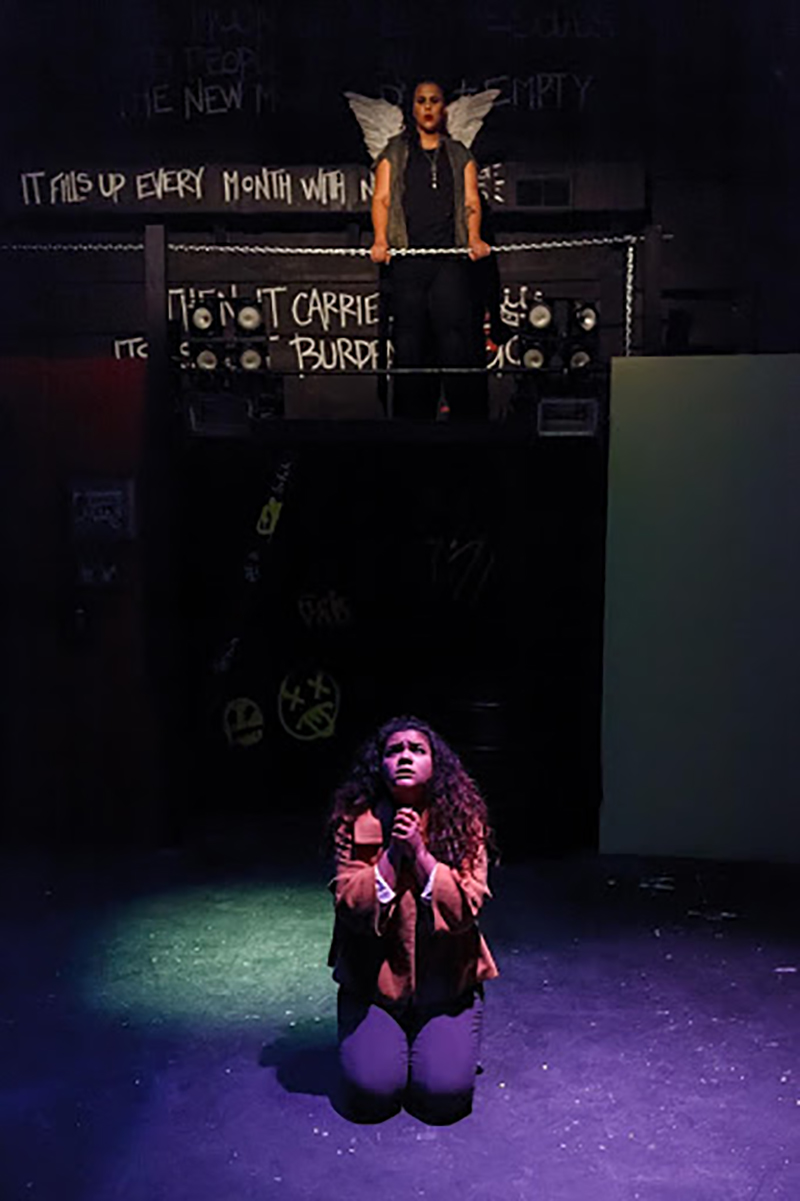With a rising awareness of racism’s pervasive presence in Champaign-Urbana’s theatre scene comes a new wave of change, with The Station Theatre taking the lead.
At the first Station Theatre board meeting after the murder of George Floyd, there was no debate about whether or not something needed to be done: the real question was what.
With the newly invigorated push of the Black Lives Matter movement this past summer, industries all over the country began to actively dissect how racism infiltrates every aspect of our lives. Theatre was no exception. In July, BIPOC theatre artists from all over the nation released a statement on “White American Theatre.” Soon after, theatre artists local to Champaign-Urbana followed suit. The content of these statements not only exposed the many ways in which racism uniquely manifests itself in the theatre world, but also contained demands to address these inequities.
![Picture of a powerpoint slide presented at the Station Theatre’s recent anti-racism town hall. A picture of a theatre ticket is placed on the lower right. The text, in bold grey font, reads: “Overall, 85* members of our theatre community completed the survey/90% [“10%†listed in white] of participants believe there to be barriers and obstacles to address before change is possible./99.9% [“<1%†listed in white] of participants believe that growing diversity & inclusion is necessary for our theatre community./99.9% [“<1%†listed in white] of participants believe concrete steps are necessary.†Photo courtesy of Rachel Storm.](https://smilepolitely.com/wp-content/uploads/2020/10/info-slide.jpg)
Photo courtesy of Rachel Storm
What inequities are we really talking about here? According to Station Theatre board member Jaclyn Loewenstein, the disparity in the number of white and non-white individuals involved in local theatre — and the way BIPOC theatre artists are treated — has been festering for decades. Yet the process of undoing those disparities has only just begun to pick up steam.
“We’re gathering data,” says Loewenstein. “I know that over the history of Station Theatre, now going on 49 seasons, there’s always been a feeling of wanting to be inclusive and diverse — but the actions necessary to truly reach communities that wouldn’t normally come to audition or come to the shows has been lacking.”
The nature of this data collection comes in the form of a series of social justice-oriented conversations introduced by the Station Theatre, with support by numerous surrounding theatres including the Champaign-Urbana Theatre Company, Twin City Theatre Company, and Parkland College Theatre. The first installment in this series came in the form of a town hall. The second was structured as a panel discussion with artists, students, and parents in the local theatre community. Future panels focusing on LGBTQ+ (or, as the Station has named it, “TLGBQAI”) and accessibility topics are currently in the works. As of now, the focus remains largely on racial injustice.
As discussed at the recent panel discussion, BIPOC individuals not only make up a small percentage of local theatre artists as is but are also further discouraged from participation by the lack of BIPOC representation seen both on- and off-stage. Loewenstein asserts that it is consequently difficult to build trust with this population and increase racially diverse involvement. However, it is still the responsibility of white theatre artists to open the doors to this relationship-building. Recalling a time when she recruited several BIPOC singers for a production of The Christians, Loewenstein recognized that many of these individuals did not return to the Station for any future productions. “I got a sense firsthand of the networking and relationship-building that is necessary but that needs to be an ongoing thing, not just ‘I need certain people for this certain show.’”

Photo by Jesse Folks
Yet roadblocks heighten when racist acts, both microaggressive and blatant, continue to occur in local theatre. Panelists detailed several personal experiences running the gamut, from racially insensitive requests to racism justified as “colorblind casting” (which continues to be a hot-button issue both locally and nationally), and urged for similar demonstrations of ignorance to be curbed by education and knowledge robust enough to avoid them in the first place.
When well-rounded roles for BIPOC are occasionally offered, panelists lamented that these roles are often contextualized within identity-based trauma and limit exploration of and exposure to other minority experiences. Loewenstein admits that “some of the shows we’ve done that do happen to be by black playwrights are fairly heavy shows dealing with trauma, and that’s not necessarily what people of color want to be acting in or spending their time and energy focusing on.” She says that board members are currently exploring plays that dive into the wealth of vibrant BIPOC experiences outside of just trauma.
The elusiveness of a decided-upon approach to tackle each of them until very recently speaks to the deeply rooted patterns of racial injustice in our county’s theatre scene. This series of conversations introduced by the Station Theatre is clearly only the beginning of what looks to be a very long process. And there are definitely still kinks in the current approach.
“The town hall was predominantly white, the leaders of the theatre companies are white, and most of the board members are white,” Loewenstein acknowledges. “But we really want to hear from the BIPOC community and artists. So that’s what this [series] is about.”








